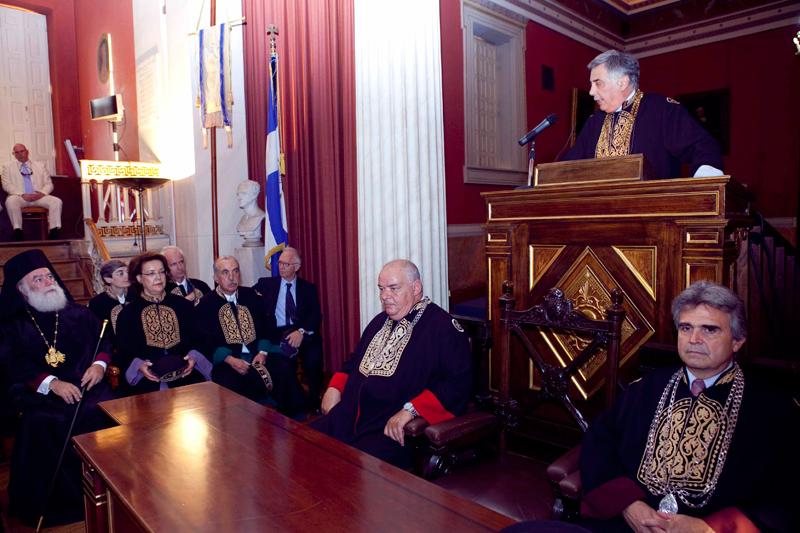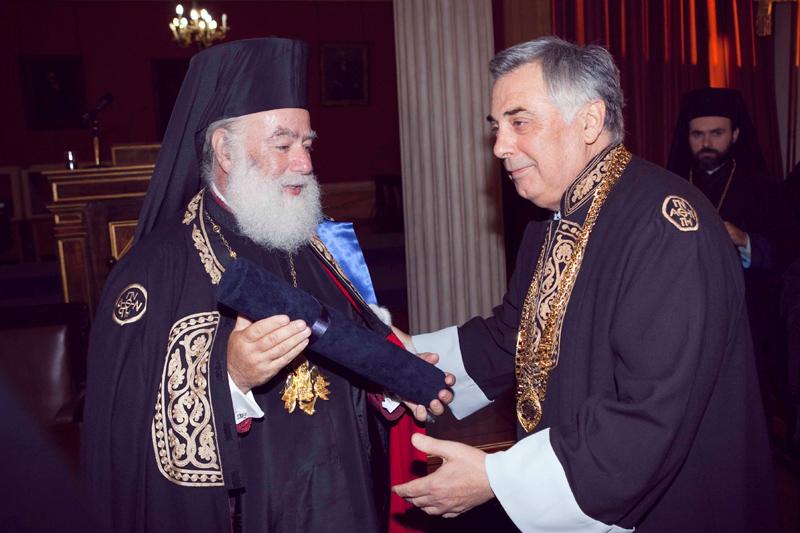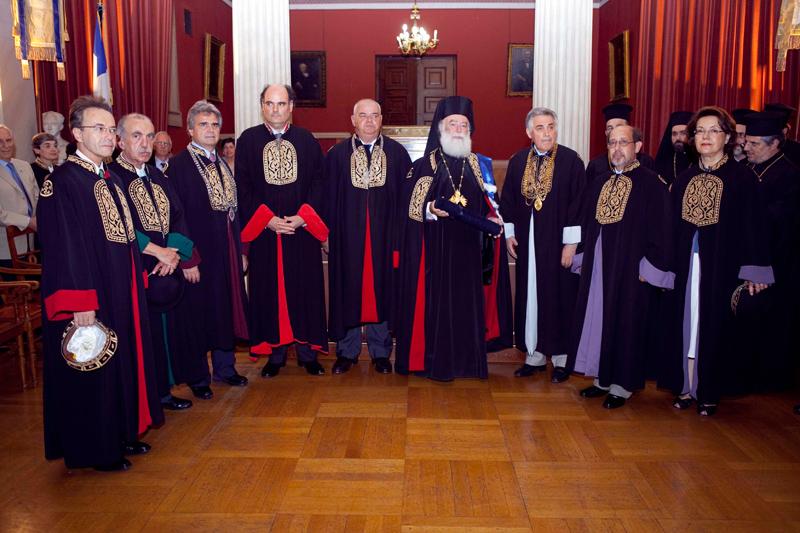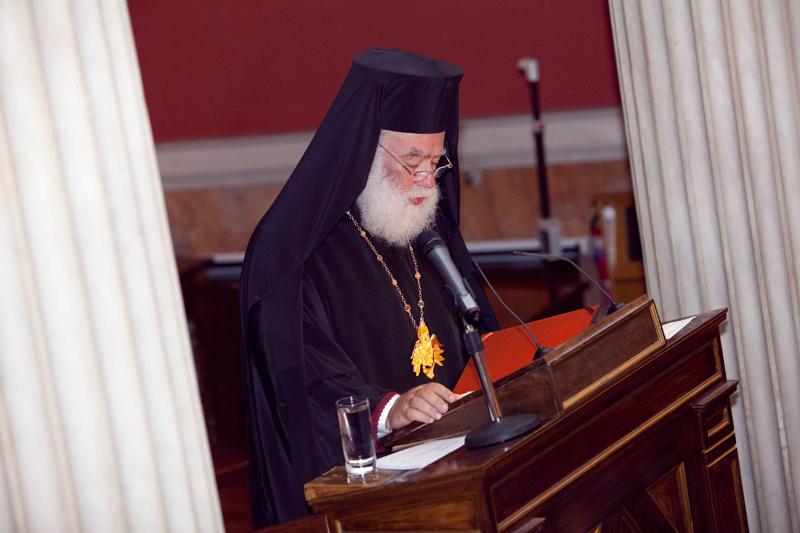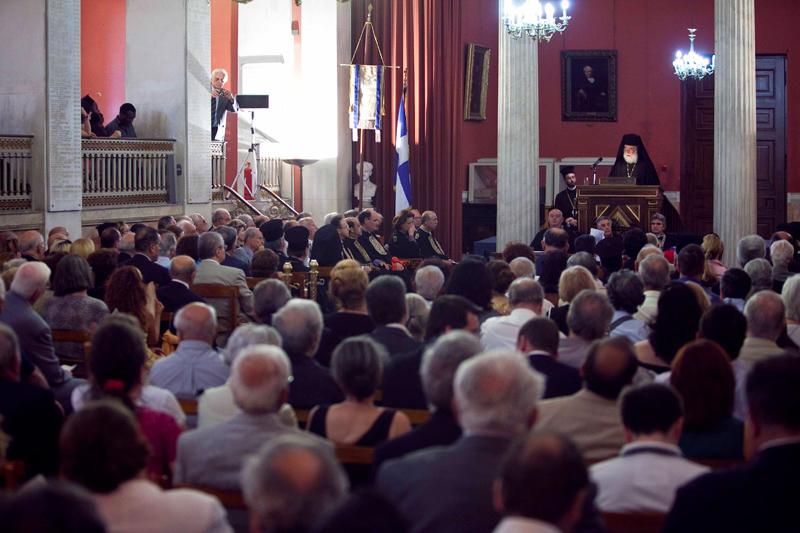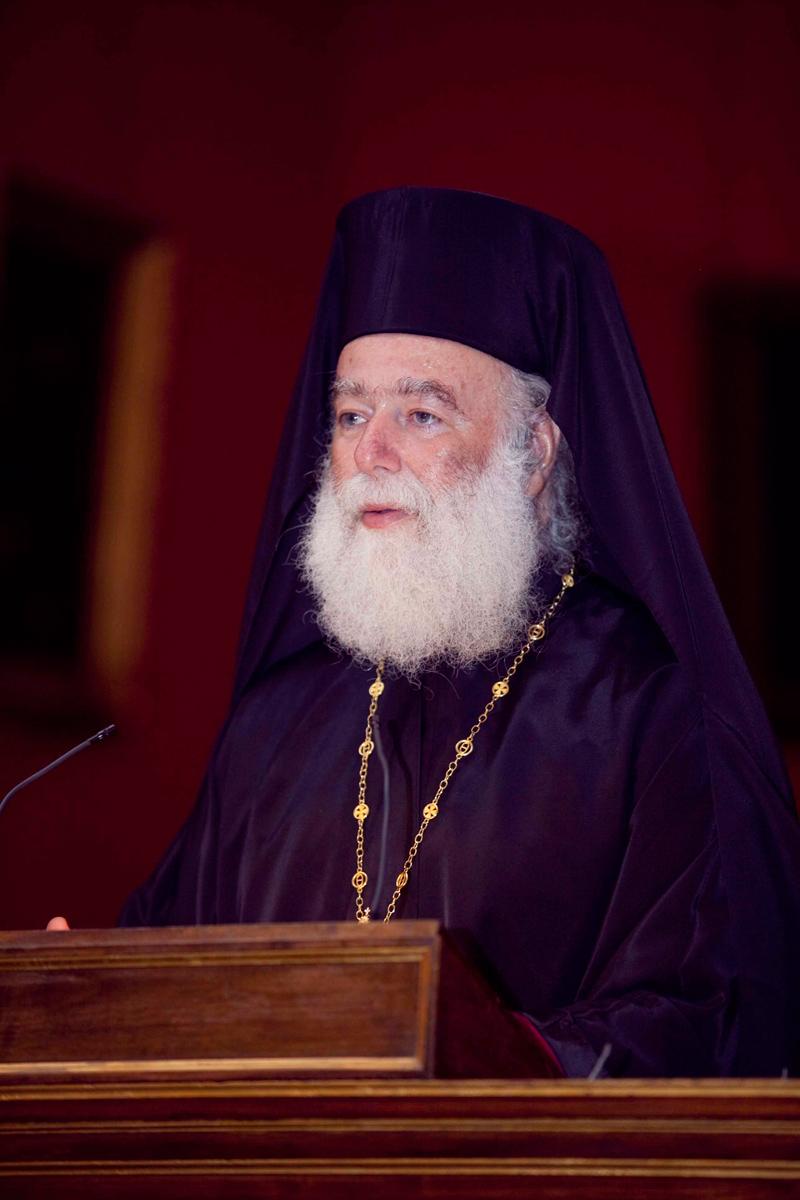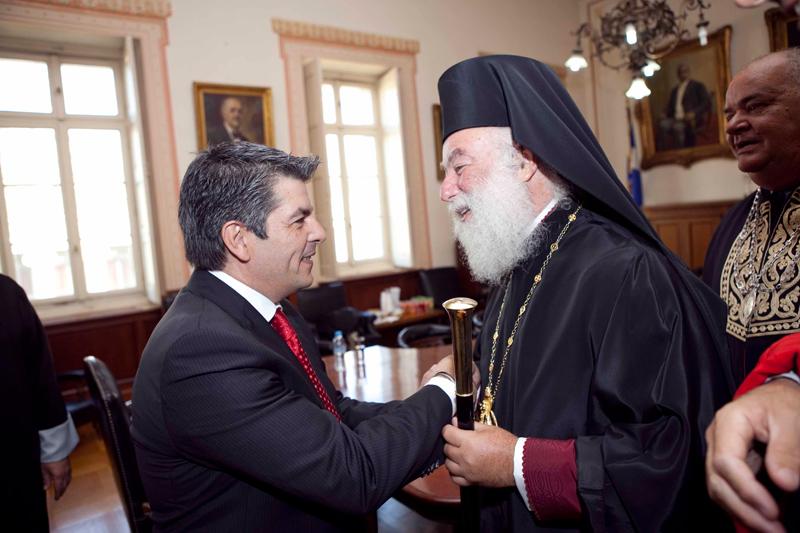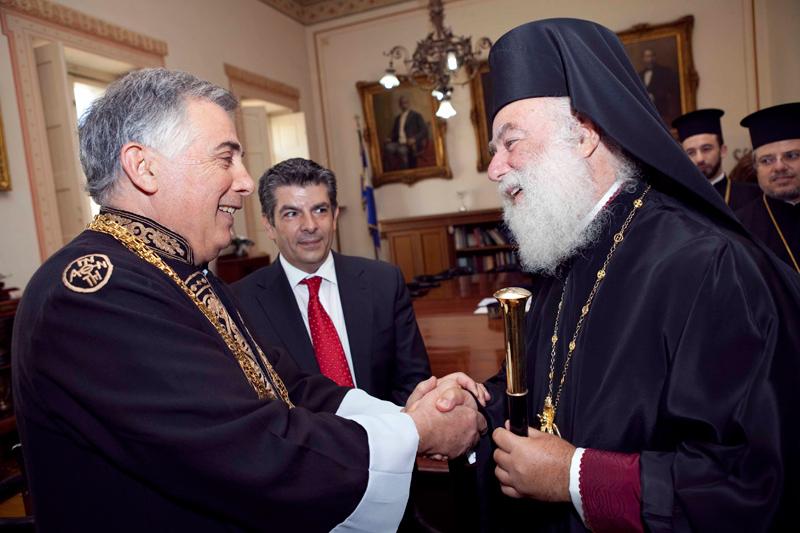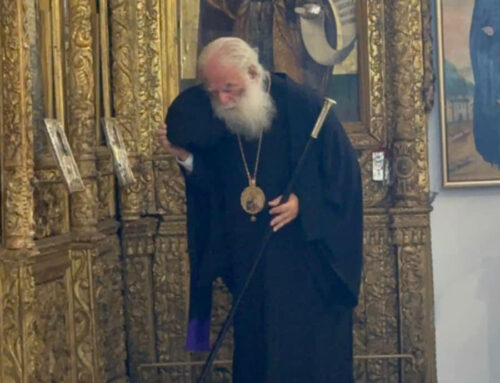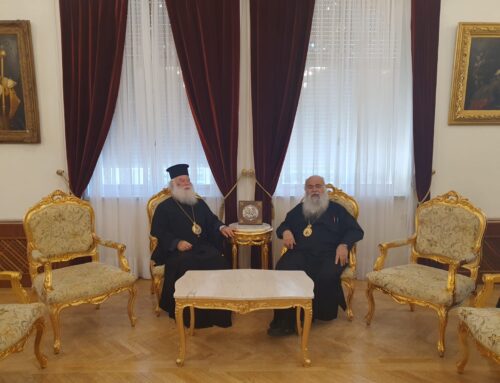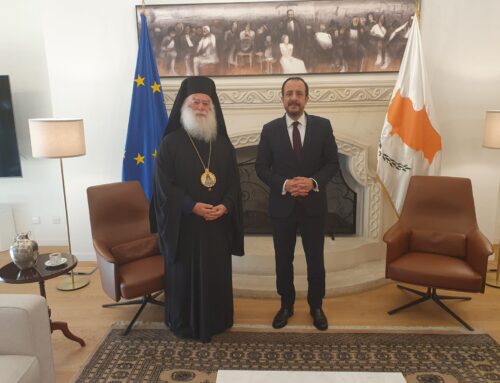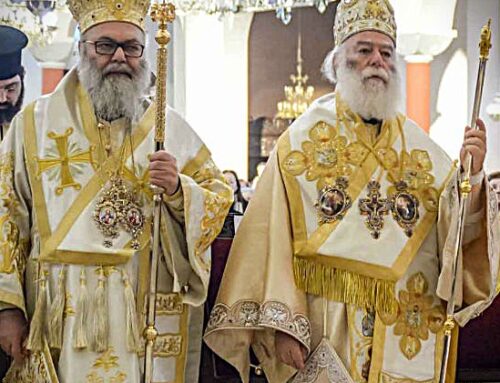On the evening of Monday 9th July 2012, His Beatitude Theodoros II, Pope and Patriarch of Alexandria and All Africa was proclaimed as an Honourary Doctor of the Law Faculty of the National and Kapodistrian University of Athens.
Present at the ceremony were His Grace Theodoritos, Bishop of Nazianzus, representing His Beatitude Ieronymos, Archbishop of Athens and All Greece, Hierarchs of the Patriarchate of Alexandria and of the Church of Greece, their Excellencies the former Prime Ministers Messrs. Konstantinos Mitsotakis, Ioannis Grivas and Panayiotis Pikrammenos, His Excellency the Deputy Minister of Education Mr. Papageorgiou, Her Excellency the Parliamentarian and former Minister Mrs. Dora Bakogiannis, other Parliamentarians, Professors, Diplomats, Senior Judiciary, Office bearers of the Throne of St Mark and scores of others.
The Eminent Chairman of the Legal Faculty Mr. Theodoros Fortsakis, read the decree of the proclamation of His Beatitude as an Honourary Doctor. His Beatitude then gave the following address:
“We look for new heavens and a new earth wherein justice dwells” (2 Peter 3: 13).
This digression in the word of the Apostle Peter is only one of the tens of references to Justice in the New Testament as a fundamental meaning of both the new reality of the world in Christ, as well as of the anticipated Kingdom of God in Christ.
In fact if the researcher counts together the references in the New Testament with similar meanings of vindication and judging in Justice, then the only meaning which is met with greatest frequency is that of love. Love first, then justice.
A common starting point for action, both of those who serve the Body of Christ , the Church, as well as of those who serve Justice, the eye of God on earth, is none other than service to mankind.
Besides which, service to mankind comprises a fundamental element of Greek Orthodox Christian tradition, the sublime standard of which is the Lord’s voluntary presence on earth.
The Lord served mankind by offering his salvation. And in an essential manner the centuries-old need for justice to which Jesus gave radically new dimensions, was also served.
And this is because, as St Paul emphasized, all people without exception are “of one blood” (Acts 17:26) a common race, which belongs to Him. In this race there are no superiors and followers, no race more superior or inferior exists, there is no distinction.
Two thousand years ago, when the greatest of the Apostles preached at the Supreme Court (Rock of Ares), he did not fail to point out that God “appointed a day when He will judge the world with righteousness” (Acts 17:31).
Divine Justice has been raised to that supreme point of reference of the global effort to attribute justice, not with the guiding principle of sending one from pillar to post.
Not with the guiding principle of the disclaimer of responsibility by Pontius Pilate, but with the guiding principle of love and forgiveness, as this was expressed at the last moment of the Lord’s life on the Cross.
It is at this point that the second basic relationship of the work of those who work for the Church and those who work for Justice is detected. And this is because, if ministry to mankind comprises the common starting point of their activity, then their function is, in both cases, a testimony of the good that they advocate.
A course which is marked by torment, meaning that this course means a conscious laying down of life for our fellow humans. It means to struggle so that love for people is not lost, for their freedom, for their inalienable rights. It means torment because communities ask for love and justice from them in a harsh and unjust reality.
It is this common area of activity and contribution from the ecclesiastical community and legal science which makes my proclamation this evening as an Honourary Doctor of the oldest faculty of the leading National academic institution an exceptional honour.
And this is, because the awarding of this commendation on behalf of the Law Faculty of the University of Athens in the historic Ceremony Hall, where thousands of young people have pledged faith in the ideals of their science, serves as an honour through my Mediocrity, to the Second Throne Patriarchate of Orthodoxy, the Patriarchate of Apostolic succession, historic legacy and national tradition.
It also constitutes a major responsibility for the patriarchate of the continent of the future, missionary witness, humanistic contribution and the dynamic advancement through time.
However, condensation within the context of a brief address about the timelessness and contemporariness of the ancient Alexandrian Church with all the manifestations of its multifaceted activities, is impossible.
That is why I wish to refer briefly only to the already experienced yet enduring reality of this prestigious Patriarchal Throne, as an unspent pioneer of the principles of justice and testimony which both Orthodoxy and established Law serve.
Indeed, the Church of Alexandria is an extension of the ministry which Jesus brought to earth as a spirit and as a project and which He expressed through His life. It was Mark, the collaborator and companion of the Apostles of Christ, who preached the word of God on the receptive Alexandrian earth where perceptions about God and man, from Pharaonic Egypt, Ancient Greece and Messianic Judea, were detected.
He sowed the seed of Christianity in Africa. He spread the Gospel of love and salvation. He was shown as the leading Saint of the God-trodden land of Egypt and as the First Martyr of Jesus Christ there.
His memory remains always alive in the age-old and often turbulent sacred course of Alexandria, encouraging and strengthening its spiritual leaders:
Origen, Pantainos and Clement who contributed theological and methodological academic gifts to Orthodoxy, on the one hand the dialectic of Christian faith with the ancient Hellenic philosophic thought and on the other the Alexandrian allegorical interpretation of Scripture.
Athanasios the Great and Kyrillos who preserved Orthodoxy from the error of the rising heresies and founded the Triadology and Christology of Orthodox Dogmatic.
Anthony the Great and the Venerable Pachomios who formulated and consolidated Eastern Orthodox Monasticism, both in asceticism as well as in its coenobitic form, as a way of total dedication of man to God.
However the prestige of an institution is not assessed only by the ministry it offers, when it is at its height. It is judged far more by the testimony it gives under adverse conditions.
The entire chorus of Holy Alexandrian Patriarchs, when the historic order made Greek Orthodox Christianity a fellow companion and traveller of Islam in the Land of the Nile, it converted the Throne of St Mark into a firm point of religious and national reference.
They are the beacons that kept the witness of the collective memory of Hellenism and Orthodoxy alive. An Orthodoxy which, although it was once hurt by dreadful attacks, rose again with God’s help, with an awareness of it spiritual independence and its mission.
And a Hellenism which, having its beginnings in the hospitable land of Egypt during the pre-Christ centuries, embraced Christian principles in the City of Alexander the Great and was sculpted with them.
And when the courageous and adventurous character of the Greeks and the Greek commercial genius once again found, during the more modern times, a glorious scope of expression in the land of the Nile, the ancient Patriarchal institution was reactivated on new spiritual foundations.
The assistance of its prominent spiritual sons, the national Benefactors of Hellenism in Egypt and of metropolitan Greece, during the years following its independence was decisive. Sons such as Michael Tositsas, Emmanuel Benakis, George Averof and a host of prominent fellow-Greeks, who I briefly mention contributed decisively to the creation of the urban order and to the banking system in the land of the Nile, led commercial transactions to their peak, gave enormous boost to letters and arts, built monumental buildings and generally led Hellenism to such a degree of height, that even today districts in Alexandria officially bear the names of Greeks who distinguished themselves, such as Zizinias, Glymenopoulos, Antoniades, et al.
The unceasing concern of those predecessor Patriarchs, who loved the arts generally, for education and culture, through the establishment of schools and educational facilities from the land of the Nile right up until the ends of Africa, the introduction of printing presses for the publication of important Greek writings and the formation of libraries, particularly that of the centuries old Patriarchal Library of Alexandria, where hundreds of manuscripts and thousands of ancient documents and rare books are stored, proves efforts made to preserve and disseminate the spiritual treasures of the Nation to all who came under the supervision of the Patriarchal Throne of St Mark, who is proud, because in total, over the two thousand years of its testimonial course it has not ceased caring for the spiritual elevation of its flock.
This work continues to this day, in the Greek Communities of the fifty-five African countries, where the local Hierarchs and the venerable clergy of the Throne ceaselessly labour over the pastoral care of the Greeks, morally and materially supporting Greek Education, contributing to Greek associations, brotherhoods and organizations, completely guarding the ideals of our indomitable people in the maelstrom of alien cultures.
However the Alexandrian Church extended the range of its ecclesial ministry and witness, and as a nurturing Mother embraced all the African people, from the Mediterranean Sea in the North to the Cape of Good Hope in the South, and from the Horn of Eritrea in the East to Cape Verde in the West.
It has become exclusively a missionary Church, the body and disseminator of the timeless and worldwide, multinational and global message of Orthodoxy on unexplored paths. The challenges for one working in the spiritual fields of Africa are huge and complex. And this because the African societies want justice, hurt as they are by their colonial past, ruined by poverty, frequently trapped in oppressive political formations.
Our African brothers and sisters thirst for Justice, because they remain unshielded against the rampant diseases, they are wronged by heightened social inequalities, they are systematically placed on the Procrustean bed of the violation of their most basic rights. Faced by these challenges modern missionaries submit whatever our tradition has that is most valuable, the Greek Orthodox ethos. This ethos, construed as a collective relation and a realization of sincere and honourable contribution, sacrifice and compassion, is a dynamic and subversive reply to the bankrupt western model of theism of man and of self-benefit. And they make practical application of Christian love, as it was taught and lived by the Apostle and Evangelist Mark two thousand years ago.
Our Patriarchate feels an obligation towards the people of Africa to teach souls the tenets of Orthodoxy, but cannot overlook the lack of basic means of survival.
That is why in our Ecclesial districts the witness of the Gospel walks hand in hand with the treatment of immediate vital necessities. Educational Institutions, hospitals, medical facilities, old age homes, alms houses, orphanages, hospices operate, for the relief of those in need.
Shafts are being sunk to attain clean drinking water, meals are prepared, scholarships are granted, technical schools and workshops are created so that professional acumen can be obtained as well as an income.
However, mission does not only mean sacrificial ministry. It also means the deposition of testimony at international forums and global organizations, briefing of international public opinion, efforts towards an awareness of man’s anxiety when he has no goods or rights which are taken for granted in contemporary developed societies.
In this respect, the words of the activist martin Luther King, receiver of the Nobel Peace Prize in 1964, remain timeless: “What our generation will one day regret bitterly, will not be so much the cruelty and injustices of evil people, but the unacceptable silence of the good”.
With the above prerequisites, the clear positions of the Alexandrian Throne for the preservation and protection of the environment, the preservation of human rights of defenceless people and susceptible social groups, particularly immigrants, women and children, the victims of trafficking which is degrading for the 21st century, and for those suffering from HIV/AIDS, are boldly submitted, always based on the Gospels, at the relative international meetings of the United Nations Organization, the European Union, the Pan- African Union, the World Council of Churches, and wherever else this is considered imperative.
Particularly on the issue of HIV/AIDS sufferers I proclaimed the beginning of a huge campaign for information and awareness of international public opinion together with the holder of the Nobel Peace Prize, Mr Nelson Mandela.
At the same time the Apostolic and Patriarchal Throne of Alexandria, as an active participant in the societies in which it operates, is not indifferent to broader developments. A featured example is the enduring historic transformation of the primitive cradle of the three monotheistic religions of the Middle East. A common practice of the Orthodox Churches in this very sensitive region, of the Patriarchates of Alexandria, Antioch, Jerusalem and the Church of Cyprus, is the strengthening of Christian morale.
Our common faith, as their Primates, as this was affirmed in our recent gatherings, under my Chairmanship, is the need to avoid embracing radical religious and political ideologies. Our common aim is the foundation of peace on solid ground, not only of tolerance, but also of the exemplary respect of diversity.
Of course our ancient Church is not indifferent to the global financial crisis either, especially when it plagues our Motherland. Greeks everywhere who have made great achievements, and who have been glorified in struggles, are in the maelstrom of a crisis which, seems to be only financial, but in essence is deeply value-based. Greeks everywhere, of the timeless topical philosophical theories and of Patristic Theology, are in danger of becoming destitute, because for the sake of a fictitious hypertrophic future, they preferred to distance themselves from the inexhaustible reservoir of values which constitute their personal and collective make-up.
They preferred to sacrifice their cultural being for the sake of the falsified culture of having. Compassion, spirituality, hospitable feelings, social solidarity and honesty in inter-personal relations and public life, have given way to individualism, brutal realism, xenophobia and racism, self-benefit and the conceited depreciation of the meaning of public interest.
At this precise point we would like to address each of you personally, the honourable University lecturers, the students of Justice, the interpreters of laws, in a spirit of humility and paternal love.
Orthodoxy believes that an imperative prerequisite for overcoming the crisis, both on a global as well as a local level, is to make mankind a believer in God, in His image.
On this course of redirection your contribution is decisive. And this because you, who teach the values and principles of equality and the Law, offer a tangible testimony of the eternal divine command “For when the earth experiences Your judgments The inhabitants of the world learn righteousness” (Isaiah 26:9). Now, more than at any other time, is your moment, with the measure of your constitutionally guaranteed possibilities, to contribute to the restoration of the feeling of justice among citizens. The citizens who are disillusioned by the social and financial inequality, the wrong choices made in the past, the impairment of the value of persons through the deification of the individual and of substance.
With these few thoughts, I express to you my paternal love and my faith in your contribution and in your testimony, which are always a gift from God, that you give equally. Once again I address my grateful thanks for this exceptional award of distinction, which is a significant point of spiritual relaxation in my difficult, but full of rich experiences, missionary course and my very responsible Patriarchal duties.
Please be assured that the Church of Alexandria night and day expends its thoughts and activities, so that the hopes and dreams of Christians can be productive. In this struggle, our only weapons in its spiritual arsenal are the Greek Orthodox principles and values.
In this struggle its most precious asset is the conviction that it is continually accompanied by our love and understanding, as it is so eloquently summarized in the honour made to its Primate. Thank you!”




